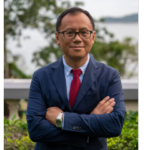Madelaine VanDerHeyden sat down with the CGF Managing Director, Wai-Chan Chan, to reflect on his first eight months at the CGF, key highlights from the past year, and what the new year will hold.
Madelaine: Can you provide some highlights from your first eight or so months at the CGF?
Wai-Chan: It has been great to meet so many members, and CEOs of the members. Having the ability to connect, albeit via Zoom, has allowed me to understand their issues, how the CGF could be helping them, and understand their ambitions. I’ve also been impressed by the energy of the CEOs to affect change for the greater good. Their passion to push this positive agenda forward has inspired me immensely over the past few months. The work of the Coalitions has also stood out. One of the ambitions of the CGF is to ensure that the Coalitions create impact, and I believe the Coalitions are close to creating significant impact. Of course, it has also been a wonderful experience to be able to spend more time in Paris and to get to meet the CGF team in France.
Madelaine: Shifting direction to talk about the new Coalitions of Action from the CGF which were introduced in 2020, these coalitions were designed to drive accelerated progress on industry goals around issues like plastic waste, health and wellness, and supply chain efficiency and sustainability. Could you highlight some of the progress the coalitions have made in the last year?
Wai-Chan: It is difficult to single out just a few of the eight Coalitions, but there have been some key moments that took place in the last year. For example, our Global Food Safety Initiative celebrated its 20-year anniversary. While celebrating this achievement, it’s important to stay relevant and reinvent oneself, which GFSI has done with the Race to the Top. Our Forest Positive Coalition also impressed, with it launching at New York Climate Week in September 2020. The Coalition focuses on trying to move certain commodity supply chains to ensure it is helping to build a forest positive future, working closely with a variety of key stakeholders. And, on the social front, the Human Rights Coalition – Working to End Forced Labour launched in December on International Human Rights Day. It’s about collective action, speaking up and taking action against forced labour. We cannot remain silent about this issue. So these are just some, but there are many more
Madelaine: I’d like you to now put some of the work of the Coalition’s into context. The target date for the UN Sustainable Development Goals (SDGs) is 2030, which is now less than 10 years away. What are your reflections are on the industry’s relationship with sustainability, following a challenging year?
Wai-Chan: Honestly, I’ve been inspired by the CEOs passion for the sustainability topic and, more specifically, the SDGs. I find inspiration in knowing that they are doing this simply because it is the right thing to do. This is often driven by consumers, sometimes by governments, sometimes by civil society or stakeholder influences, but often because the CEOs want to do the right thing. Another reflection is that investors now begin to view sustainability as an important aspect of how they invest. This has been seen with an emergence of the B Corp, but also, there are now many investors who have been quite public about making investments based on a company’s sustainability record. There are important shifts taking place, and our Coalitions want to be at the forefront of the change needed if we are to secure sustainable food systems, and as we look ahead to the first-ever UN Food Systems Summit and COP26, both taking place later this year.
Madelaine: If we look more closely at SDG 12, which is focused on sustainable food consumption and production, why does the consumer goods industry need to focus on food systems and why is action from the industry so critically important?
Wai-Chan: Sustainable food consumption and production is absolutely critical. As a consequence, the CGF is involved in the UN Food Systems Summit in many different ways. The CGF is involved in some of the action tracks at the moment, and I welcome anyone from CGF membership to get in touch for more information. Food systems transformation is so important because food is by definition the most needed segment of the consumer space. People cannot do without food and therefore making food production sustainable for everyone is very critical.
The way that the food system is currently running can lead to problems and the need to change things. The need for everybody to have safe and nutritious food is perhaps the most basic right. Second, there is a need to consume food in a sustainable way. Therefore, it is important to design a food system where the food is healthy for both people and the planet. Another consideration is whether production is sustainable; meaning we are not depleting earth’s natural resources or impacting through excessive greenhouse gas emissions. We also need for supply chains to be equitable for everybody and be robust and resilient. These are the five tracks of the UN Food Systems Summit, and it’s easy to see why.
Madelaine: In 2020, the CGF worked with members to leverage their collective power as leaders of global brands on several key issues, like the rights and well-being of seafarers, sharing best practices to mitigate the impact of COVID-19, and in the need to support vulnerable communities hit hardest by the pandemic. However, what has good leadership looked like for you during this crisis, and what advice or thoughts could you share about leadership while moving forward in 2021, and hopefully out of the pandemic?
Wai-Chan: Again, the importance of doing what is right is what really matters. While this might sound obvious, people can get diverted away from doing what is right for several reasons. But, to me, you have to prioritise what is right. It’s an important mindset to have in today’s leadership positions. Another important aspect of leadership is decisiveness. While it is important to be agile and pivot when needed, a leader generally should not constantly be changing their mind about things, particularly in the current climate. Collaboration is critical. This is something that a particularly unique part of the CGF’s DNA. We shouldn’t let perfection be the enemy of progress to demonstrate, as it is more important to actually do something, learn along the way and then adjust as needed. Lastly, I think leaders need to inspire, they need to inspire change, and, to do this, they need to inspire their employees and their wider communities.
Madelaine: Wrapping up, what’s your ambition for the CGF in 2021?
Wai-Chan: First, it is important to think about the CGF members and how to remain relevant to them. The CGF is always looking for ways to engage members and add value. Another ambition is to make progress on the Coalitions and deliver the action plans of each coalition. And, internally, I want to inspire my team here at the CGF and make it a great place to work. And, on a personal note, I would love to get out and meet people physically, in the second half of the year, assuming the situation permits it.
This blog was written and contributed by:
Wai-Chan Chan
Managing Director
The Consumer Goods Forum
Madelaine VanDerHeyden
Communications Officer
The Consumer Goods Forum


